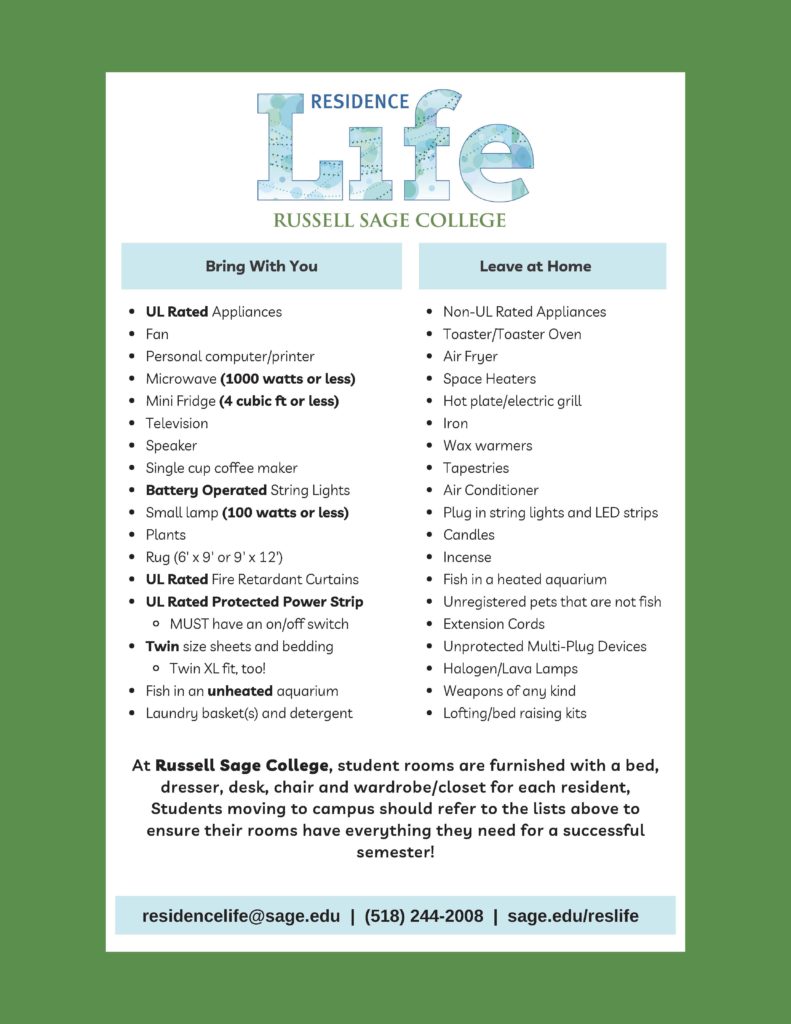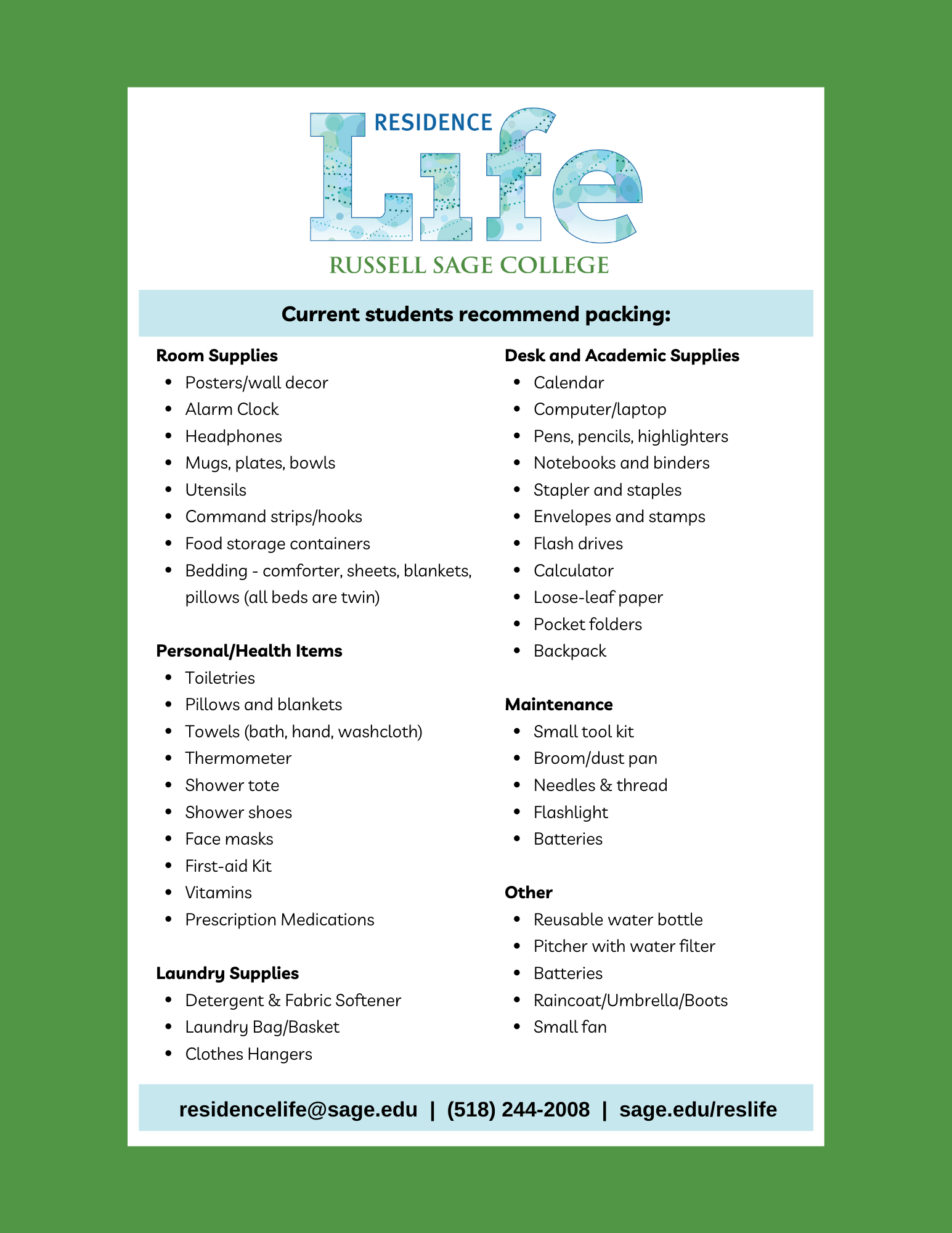Residence Hall Policies and General Information
Residence Contract
Resident students are required to submit a signed residence contract each year they live on campus.
Damages to College Property
Students are held personally responsible for the condition and furnishings of their own room and jointly responsible for public areas. A resident is also responsible for the loss, theft or damage of college and/or personal property by the resident or guest(s).
Overnight Guest Policy
Residents may have no more than 2 guests per resident in their room, to the extent that it does not negatively affect the shared living environment created by the residence hall atmosphere. A guest is any person who intends to visit or sleep in a residence hall room and is not a resident of that room. Rooms may not be used by any person(s) without a resident of the room present.
Overnight guests may stay only a maximum of 5 nights in a one month period. An overnight guest may stay no more than 2 consecutive nights during one visit. The permission of the room’s other occupant(s) must be obtained by the hosting student for an overnight guest.
Furnishings
- All students in a residence unit will be considered responsible for the furnishings in a public area.
- Each student room is furnished with a bed, dresser, desk and chair. Students are responsible for furnishing their own pillow, linens and curtains, which must be fire-retardant.
- The College furnishes student rooms. The students may bring in only small items of furniture. College furniture may not be removed from the room. The resident will be assessed replacement costs for any missing or damaged furniture.
- Furniture may not be removed from the public areas of any residence hall.
- Painting or stenciling of rooms is strictly prohibited and subject to a maintenance fee.
- Laundry machines on the Troy campus and in the Albany campus residence halls do not require coins or cash. However, laundry machines in University Heights College Suites are coin-operated.
Items to Bring With You

Current Students Recommend Packing

Keys and Locks
Every resident student is issued one room key, and one front door key or fob, when they check in. The College strongly advises each student to lock their room whenever they leave and when sleeping. If a student loses their key(s) and/or fob, or they are stolen, a lock change will occur at a cost to the student.
Parking
Students can pick up parking stickers during check-in at the Public Safety Office for a nominal fee. Don’t forget to bring your car registration and plate number to secure the sticker.
Mail Delivery
Resident students have mailboxes that are assigned to them that are located in the Administration Building. The mailboxes may only be opened with a key, which students receive upon checking in to the residence hall. The following is the correct format for addressing mail and packages:
[your name]
Russell Sage College
[your mailbox number]
140 New Scotland Avenue
Albany, NY 12208
[your name]
Russell Sage College
[your mailbox number]
65 1st Street
Troy, NY 12180
Opening and Closing of Residence Halls
Opening and closing dates and times for room occupancy are specified in the college calendar and must be observed. Residents must vacate their rooms during vacation periods when the residence halls are officially closed.
When the residence halls are closing, information will be distributed to residents regarding appropriate closing procedures. Failure to follow these procedures will result in charges for improper checkout.
At the end of each term, the student is expected to vacate their room within 24 hours of their exam or at the final closing deadline, whichever comes first.
Pets
Out of consideration for people with allergies, because of possible health hazards and in consideration of state and local health standards, only fish kept in an unheated bowl or aquarium are permitted. This policy includes “residing” as well as “visiting” pets.
Quiet and Courtesy Hours
Creation of an environment conducive to study is a primary objective in the residence halls. This requires that each resident show consideration for others by keeping the noise level low and contained within the space of his/her room so that students who are studying will not be disturbed. Quiet hours are standard as follows: weeknights 11 p.m. to 8 a.m.; weekends 1a.m. to 9 a.m. Courtesy hours (students are required to be considerate of the needs of others and govern the noise level of their stereo, gatherings and personal activities) exist at all times. Strict quiet hours, known as study hours, (24-hour quiet hours) will be in effect during Reading Days and examination periods.
Room Entry/Inspection
Russell Sage College respects a student’s right to privacy, but when the interests of the college community require, or when any safety, repair or maintenance necessitates, the college reserves the right to inspect any college room.
Coeducational Housing at University Heights College Suites
Russell Sage College students living in University Heights College Suites have the opportunity to elect to live in coeducational apartments by indicating the choice during the room reservation process by signing a coeducational housing preference form.
Coeducational suites must have an even distribution of gender identities, here defined as two pairs of students who identify in the same way. Each gender pair will share the same side of the apartment as well as the bathroom adjacent to their single rooms.
Coeducational housing is opt-in only. If no preference form is signed, it will be assumed that the student wishes to live in a single-gender suite, and will be housed as such.

